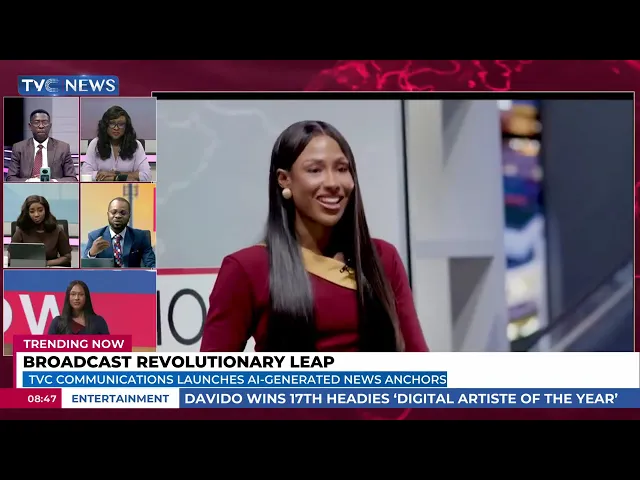Trending Now: TVC Communications Launches AI-Generated News Anchors

AI news anchors arrive in Nigeria
In a digital twist that brings Nigeria squarely into broadcasting's future, TVC Communications has unveiled the country's first AI-generated news anchors. This leap forward allows the network to deliver news in Nigeria's four major languages—English, Yoruba, Hausa, and Igbo—revolutionizing how millions of Nigerians consume information while challenging our perceptions of what journalism might become.
Key developments in TVC's AI anchor launch
-
Language diversity breakthrough: Unlike other AI anchor implementations that focus solely on English, TVC has created AI versions of their human anchors that can deliver news in Nigeria's four major languages, dramatically expanding their potential audience reach.
-
AI as complement, not replacement: TVC executives and anchors emphasized repeatedly that these AI systems are designed to expand human journalists' capabilities rather than replace them—serving as tools to deliver news in more languages, reach dangerous locations, and operate continuously.
-
Built-in safeguards: The network is addressing misinformation concerns through transparency measures, including clear AI labeling on all AI-generated content and maintaining the same editorial oversight process used for traditional broadcasts.
The complementary future has arrived
The most profound insight from TVC's launch is the shift toward viewing AI as a journalistic ally rather than existential threat. As TVC anchor Ria noted, the innovation isn't cause for job security fears but rather excitement about how it might make journalism safer and more efficient: "When you think about journalists who are forced to report in war-torn countries…this could change the way that they report and keep journalists safe."
This perspective marks a significant evolution in how newsrooms are approaching AI—not as replacement technology but as augmentation tools that handle repetitive tasks while freeing human journalists to focus on investigative work, emotional storytelling, and nuanced reporting that machines simply cannot replicate.
Beyond the obvious benefits
What TVC's announcement doesn't fully explore is how AI anchors might solve one of African journalism's persistent challenges: resource constraints. Across the continent, news organizations often lack the budget to maintain correspondents in multiple regions or produce content in numerous languages. AI anchors could democratize news access by making multilingual broadcasting financially viable for smaller outlets that previously couldn't afford such coverage.
However, this technological advance raises important questions about audience trust
Recent Videos
How To Earn MONEY With Images (No Bullsh*t)
Smart earnings from your image collection In today's digital economy, passive income streams have become increasingly accessible to creators with various skill sets. A recent YouTube video cuts through the hype to explore legitimate ways photographers, designers, and even casual smartphone users can monetize their image collections. The strategies outlined don't rely on unrealistic promises or complicated schemes—instead, they focus on established marketplaces with proven revenue potential for image creators. Key Points Stock photography platforms like Shutterstock, Adobe Stock, and Getty Images remain viable income sources when you understand their specific requirements and optimize your submissions accordingly. Specialized marketplaces focusing...
Oct 3, 2025New SHAPE SHIFTING AI Robot Is Freaking People Out
Liquid robots will change everything In the quiet labs of Carnegie Mellon University, scientists have created something that feels plucked from science fiction—a magnetic slime robot that can transform between liquid and solid states, slipping through tight spaces before reassembling on the other side. This technology, showcased in a recent YouTube video, represents a significant leap beyond traditional robotics into a realm where machines mimic not just animal movements, but their fundamental physical properties. While the internet might be buzzing with dystopian concerns about "shape-shifting terminators," the reality offers far more promising applications that could revolutionize medicine, rescue operations, and...
Oct 3, 2025How To Do Homeless AI Tiktok Trend (Tiktok Homeless AI Tutorial)
AI homeless trend raises ethical concerns In an era where social media trends evolve faster than we can comprehend them, TikTok's "homeless AI" trend has sparked both creative engagement and serious ethical questions. The trend, which involves using AI to transform ordinary photos into images depicting homelessness, has rapidly gained traction across the platform, with creators eagerly jumping on board to showcase their digital transformations. While the technical process is relatively straightforward, the implications of digitally "becoming homeless" for entertainment deserve careful consideration. The video tutorial provides a step-by-step guide on creating these AI-generated images, explaining how users can transform...
